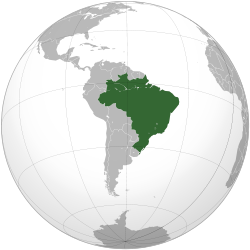The Dangerously High Cost Of Amazon Beef
By Tierramerica
A delicious 500-gram Amazonian beef steak produced with 7,000 grams of carbon dioxide and 7,000 liters of water, mixed with belched methane, is the ideal recipe for climate change.
By João Meirelles and María José Barney González
The livestock industry, and especially cattle production, is one of the world’s most significant contributors to climate change.

Increased buying capacity is leading many who have historically eaten mainly grains, fruits and vegetables to increasingly add meat and dairy products to their diets. This trend, combined with unsustainable production practices, particularly in the Brazilian Amazon, can lead to the collapse of the Amazon rainforest biome and the environmental services it provides to the planet.
According to a report published by FAO, The State of Food and Agriculture 2009, livestock production is responsible for 18 percent of global greenhouse gas (GHG) emissions and increased deforestation in numerous countries, while contributing less than two percent of global gross domestic product (GDP).
This limited contribution to GDP, however, takes up 26 percent of the earth’s ice-free land surface for grazing, and 33 percent of agricultural cropland for the production of livestock feed.
There is pressure to double beef production from 228 million tons annually today to 463 million tons by 2050, which will mean an increase of more than 73 percent in cattle herds.
Since the 1970s, the Brazilian government has implemented policies and provided subsidies to support cattle ranching. As part of these policies, the Brazilian Development Bank (BNDES) has invested more than 10 billion dollars in the beef processing industry, with approximately 30 percent spent on loans and 60 percent on acquisitions (by companies like JBS/Friboi and Marfrig), while the other 10 percent is kept for future acquisitions.
The traditional slash-and-burn practices used in the Amazon to steal land from the rainforest for use as grazing land means its rich biodiversity is lost as a service to the planet.
These practices also release massive amounts of carbon dioxide, a greenhouse gas, into the atmosphere. Amazon deforestation is estimated to represent five to six percent of the world’s GHG emissions, and contributes 75 percent of Brazil’s sizable carbon dioxide emissions.
By 2009, approximately 74 million hectares or 15 percent of the Brazilian Amazon rainforest – an area equivalent to Germany, Austria and Italy combined – had been deforested. Almost all of this land is now used for cattle pasture.
Beef is considered an expensive food in most of the world. But the price of a beef steak fails to incorporate the real cost of its production footprint: the production of one kilogram of beef leads to the emission of 15 kilograms of carbon dioxide and uses up 14,000 liters of water.
This means that the relatively “cheap” beef arriving on your plate from the Brazilian Amazon is actually extraordinarily costly in terms of its environmental and economic footprint.
Beef production in the Amazon also has serious social impacts. It generates little employment, most of it poorly paid, and on some Brazilian cattle ranches, slavery and child labor are still common practices.
The expansion of cattle production into the Amazon rainforest region over the last 50 years has been greater than at any other time in history.
If we project the growth of the Brazilian cattle herd for the next 20 years based on the 1.7 percent growth registered from 1994 to 2007, the result is 103.7 million head of cattle in the Amazon by 2030, which could lead to the deforestation of 55 percent of region.
All of these factors stand in contradiction to Brazil’s commitment to cut GHG emissions. The key challenge facing the country’s leaders is to respond to the livestock demands of the market in ways that do not endanger social equity, the environment and public health.
Urgent action is needed to transform the cattle and beef production value chain. We must campaign for change by demanding:
- National and international policies and regulations aimed at socioeconomically and environmentally sustainable cattle and beef production.
- Control and enforcement of legal standards for all activities in the cattle-beef production chain in Brazil, with an emphasis on the Amazon region.
- Monitoring systems to ensure the implementation of policies and regulations and the enforcement of laws.
- Sustainable and inclusive policies geared to the needs of traditional rural communities, peasant farmers and small-scale producers, to increase their capacity to implement more efficient and sustainable production practices, as well as promoting their active participation in the cattle-beef production value chain and access to technical and financial services.
- Greater awareness among consumers worldwide of the real cost of beef.
- The development of environmental awareness and promotion of environmentally friendly production practices among traditional rural communities, by involving them in a process of monitoring the impact of cattle production on their livelihoods and diversifying strategies for the valuation of the rainforest, such as the provision of environmental services and sale of other products that contribute to maintaining biodiversity.
- Research activity in which studies of the cattle-beef production value chain include the environmental and economic impact of this activity on economically and socially excluded communities.
- Strategies for better production practices that promote more sustainable production technologies, making more efficient use of resources.
João Meirelles is the director and María José Barney González is a consultant at the Peabiru Institute, based in Belém, Brazil (http://www.peabiru.org.br/index-.htm).
